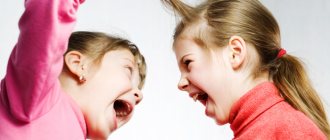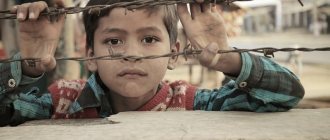Depression is one of those affective disorders that are steadily progressing in quantitative terms in our time. This condition classically includes a triad of symptomatic signs: hypothymia (decreased mood), bradypsychia (slow thinking with difficult associative characteristics, sometimes there is a feeling of guilt or fixation on a traumatic situation) and decreased motor activity.
According to WHO statistics, about 350 million people currently suffer from depression (and it must be taken into account that this refers only to diagnosed cases when the patient seeks help from a doctor). Many researchers note that depression is currently “getting younger” and depression in children is now considered in a separate category.
At what age can depression appear in a child and what causes it?
The topic of studying the phenomenon of childhood depression was discovered at the beginning of the twentieth century by Kraepelin, who noted in particular that 1.5% of all cases of diagnosed depression occur in the first 10 years of patients’ lives. However, Kraepelin did not describe the exact picture of the manifestation of childhood depression in his works, and later scientific data appeared on the characteristics of depressive manifestations in young children (up to 3 years). (V.V. Kovalev, 1985).
That is, depression in childhood is a very real phenomenon observed by psychiatrists all over the world. As a rule, such children are passive, lethargic, do not show interest in their surroundings, have a poor appetite, a pained facial expression, and their movements are characterized by monotonous and rhythmic movements. In foreign literature (Matejcek, Langmeyer, 1984), signs of childhood depression (their appearance) are often associated with mental deprivation of the child, his isolation from his mother or other significant adult, for example, due to his placement in some specialized institution or improper attitude to him in the family. Therefore, in order to lift a child out of depression, it is necessary, first of all, to change his life situation and begin treatment as early as possible.
It should be noted here that the listed signs may outwardly seem identical to the manifestations of early childhood autism (RDA is a purely our, domestic term; the term “autism” is recognized in world practice; this circumstance is associated, rather, not with medical categories, but with the fact that There is a problem in domestic medicine in terms of classification and definition of the term autism in relation to adults). So, do not confuse the above manifestations of childhood depression with autism or the spectrum of autism disorders, as there are very significant and clear differences.
Langmeyer and Matejcek o An autistic child very rarely (in severe cases - never insists on contact even with a significant adult, sometimes reacts sharply and negatively to tactile (physical) touches to him, and such manifestations are often clearly noticeable already at a very early age and this the condition in an autistic child is in no way connected with external factors, that is, the cause of autism is in no way caused by separation from the mother, a traumatic experience, etc.
What then?
A depressive episode in a child without treatment lasts on average 9 months. This is the duration of an entire academic year. Children usually fall sharply behind their peers academically and drop out of social life. In fact, they lose an entire year of life.
Depression often returns. A study published in The Journal of the American Medical Association shows that adults who experience depression during adolescence earn less than their healthy peers, are less likely to obtain a college education, are more likely to be unemployed, and experience more problems at work, social and family life. life. They suffer from depression twice as often as adults who have not previously had such problems. 7% of them commit suicide, 34% attempt it (0% among those who did not suffer from depression in their youth).
Photo from vitamindcouncil.org
What are the symptoms of childhood depression in childhood?
Loss of cheerfulness, curiosity, low mood, tearfulness, lack of initiative, sad facial expression, excessive anxiety about separation from loved ones, fearfulness, nightmares. From the somatic side: symptoms of autonomic dysfunction of digestion, cardiovascular system, thermoregulation, sleep disturbance and appetite.
Naturally, any attentive and responsible parent, observing a change in their child’s behavior and seeing atypical traits for him, will think and try to cope with the situation. If you see that you cannot help your child on your own, then it makes sense to contact qualified specialists as soon as possible. The problem of childhood depression is dealt with by psychotherapists, psychiatrists, and, as an auxiliary link, psychologists.
The difficulty of differential diagnosis of this condition lies in the fact that often manifestations of depression look like childish whims; in the family, the child may behave rudely, become disobedient, or present somatic complaints. That is, the symptomatic spectrum is quite wide, the manifestations are very diverse, and the clinical picture can be replete with many disorders, which often turn out to be fragmented and syndromic incomplete. (Iovchuk N.M.) This is where the difficulty of making a diagnosis lies.
The situation can be further aggravated by the insufficient psychological and pedagogical literacy of parents: many of these manifestations often become the subject of comments and reproaches from parents, which is understandable, because a schoolchild who is constantly lying on the sofa, detachedly looking at the TV screen, or a preschool child who yells at his mother is called out more often The whole desire is to stop such behavior by punishing, admonishing or reproaching, which only aggravates the situation, and makes the child’s internal experiences simply unbearable.
This circumstance is further darkened by the statistics of child suicides, in terms of the number of which, unfortunately, we have been leading among all countries in the world for a long time. There are very few countries in the world where the mortality rate due to suicide in children aged 5 to 14 years would exceed 1 per 100 thousand children. In Russia, this figure is 2 times higher, that is, 2 children per 100 thousand children. It is noted that a larger percentage of them are children who suffered from depressive disorders. This problem is especially acute during the puberty period, since depression in adolescents is a frequent cause of suicidal intentions or acts of suicidal behavior.
Moms tell
Here are some stories from life (names of mothers and children have been changed). In all cases, the diagnosis of depression was made by a doctor.
Elizaveta, Yegor’s mother: “It all started in the fifth grade. He seemed to be having difficulty coping with the new demands of school. He said that he didn’t want to go to school, that he wouldn’t go, that his stomach hurt. He vomited several times before school. Then he began to say that his legs could not walk. In general, it began to seem to me that this was a strange, unfamiliar child: mine never slammed doors or screamed hysterically. Conversations with him turned into walking through a minefield: you never know what he will react to and where he will explode. He began to have difficulty falling asleep at night, cried, shouted that he would not get enough sleep, that he would not be able to go to school in the morning, and as a result he stopped sleeping completely. He had a headache all the time and began to have severe migraines.
I almost stopped studying - I got two and three grades in all subjects, one notebook for all my lessons, I didn’t do my homework, after school I hung out with my friends in other people’s yards. Friends said - maybe he had started adolescence? But what is the teenage age of a little ten year old?
Then it became completely scary: he started talking about the meaninglessness of life, about the fact that he didn’t want to live, that everything around him was just a dream...
He did nothing, sat at home and played with his cars, which he loved to play with when he was two years old. He refused to wash, get his hair cut, brush his teeth, comb his hair, or change his clothes. He complained that he could not read - the letters did not form words, did not understand the meaning of what he read, could not solve the problem because he did not understand what it was about. It was only then that I realized what was wrong with him - and ran with him to the doctor.”
Tatyana, Anton’s mother: “Two of Anton’s classmates bullied him right during breaks in the corridor, under the teacher’s nose, humiliated him. And at that time he also had an exacerbation of bronchial asthma. The result is a complete loss of working capacity, loss of all school skills, severe fatigue, drowsiness and, at the same time, very poor sleep; noticeable decrease in self-esteem, fears, wrote several times at night.
The exacerbation of asthma could not be stopped for a long time, an infection developed, resulting in pneumonia. I assumed depression and went with him to a clinical psychologist and neurologist. The first took him to classes, the second prescribed treatment. It helped, he was released, but then he recovered for more than two years, and to this day it all echoes with self-doubt.”
Galina, Seryozha’s mother: “It all started in the fourth grade, in the fall. Children with communication difficulties are probably prone to this in principle.
In conversations before going to bed, he began to express fears for his life and especially for mine. There was a global fear of death. He cried. A teacher at school noticed a sharp decline in academic performance and worsening behavior.
Something had to be done to help the child. The doctor found out everything. The treatment helped quickly, and that was the end of it. Perhaps because, as the doctor said, we caught depression at the very beginning stage.”
Marina, German’s mother: “My son turned 13, he went to seventh grade. Almost simultaneously, the father left the family and the grandmother, whom the son loved very much, died. The son was lying on the sofa hugging the cat and doing nothing. He built houses from pillows and blankets. Lost appetite. Dizziness and lightheadedness appeared.
My son started leaving school after two or three lessons. I didn’t study my lessons at all, and I explained this by laziness, lack of willpower: “I want, I will, I’m going to - but tomorrow, today I can’t.” Then I became seriously ill. While I was in the hospital, my son lived with relatives, refused to wash or brush his teeth, skipped school, lay in bed, and cut off all social contacts. Treatment was prescribed, but it did not help much, although sleep and appetite were restored. The whole school year is gone. Now he is studying at home, teachers come, but he cannot study his unloved subjects for more than 40 minutes, he immediately gets headaches and lightheadedness.”
Photo from indianexpress.com
School as a reason
After the age of seven, school becomes the main cause of childhood depression. The most typical problems are difficult adjustment to the first and fifth grades, problems in relationships with classmates, school bullying and unprofessional behavior of the teacher.
Iovchuk and Severny in the article “On the problem of didactogenic disorders in schoolchildren,” published in 2007, write: “In the last 10 years, among the children we have observed, there has been a steady increase in severe and prolonged depressive conditions, definitely associated with schooling, namely with the inadequacy of educational measures, unfair attitude of the teacher, including underestimation of grades, the use of “neuroticizing” tests (primarily the reading speed test), psychological and physical violence.”
The teacher may not humiliate the student personally: the child watches how the teacher communicates with the class and is afraid of public humiliation. The child begins to get sick, complains of stomach pain, nausea, he vomits before school, he refuses to go there under all possible pretexts... Fears worsen, cognitive impairments appear (children have difficulty concentrating, it’s hard for them to think, they complain about their own dullness), studying becomes difficult. impossible...
The hardest thing is the reaction of parents to children's problems. Parents require their child to study well. Parents work with him additionally, increase control, deprive the child of pleasure - and all this increases depression.
On one parental Internet resource, one mother complained: “I have already deprived him of a computer, TV and walks, the New Year was canceled, and he didn’t deserve a birthday present either. I started using VKontakte from my phone, and I took my phone too. Now he lies on the couch all day and still does nothing. How else can I punish him?
Sometimes parents resort to physical punishment; The consequences for a depressed child can be dire.
Iovchuk and Severny write: “In correctional work, the participation of parents is extremely important, who, as a rule, do not understand the nature and depth of the child’s mental disorders, at first refuse to accept psychiatric, especially psychopharmacological therapy, and tend to accuse the child of “simulating”, laziness, hooliganism, etc. .P.
If parents behave incorrectly, depression becomes even more protracted and leads to deep school disadaptation (incomplete school, the need to transfer to an external school, an individual education school for children with poor health and disabled children). However, with persistent psychotherapeutic work with parents, it is most often possible to involve them in the psychocorrectional process in the interests of the sick child. Which, unfortunately, can almost never be said about teachers.”
Take care of yourself
It is extremely important that you don't neglect your physical and mental health because it will determine whether you can cope emotionally with all the difficulties.
Don't accumulate your emotions. It's normal to feel overwhelmed, frustrated and helpless from time to time. Chat with friends and talk about how you feel.
Avoid just one emotional state - guilt. Self-flagellation will not lead to anything good and will also add an additional level of stress.
And to understand your child more, you can read some of the following books:
- "Teenage Depression" by Douglas Riley.
- “Our uncontrollable teenagers”, Alexey Bulgakov.
- “Aggressive teenager”, Tatyana Avdulova.
- “Psychology of adolescence”, Tatyana Avdulova.
We sincerely hope that you will need this article only for general development. But in any case, we wish you good luck!
We also recommend reading:
- Storytelling
- Overcoming spiritual depression
- Positive therapy for children
- How to Prevent Stress and Depression from Tony Robbins
- Everything is bad! What to do?
- Development of communication skills in children
- Munchausen syndrome
- Poor memory: what to do?
- How to protect your child from smoking
- A Guide to Relieving Depression and Apathy
- Post-traumatic stress disorder: briefly about the most important things
Key words:1Psychoregulation
Normal or depressed state
Your child may feel sad, depressed, and cry for a while. This is a natural and extremely necessary way for our psyche to give vent to emotions.
You should not immediately run to a psychoanalyst if your child had a fight with friends or lay in bed all day. Watch!
You need to worry when symptoms of depression appear more and more often. And the child is in a normal state of mind less and less often. The line between normal and not normal is very thin.
Depressive triad
In psychotherapy, there is a symptom complex called the depressive triad - three main manifestations of depression:
- Bad mood.
- Deterioration in the quality and speed of thinking.
- Lack of motor activity (lethargy, apathy).
These three symptoms are indicators of the child's condition. If you observe kinks in one or more of them, contact a specialist.











